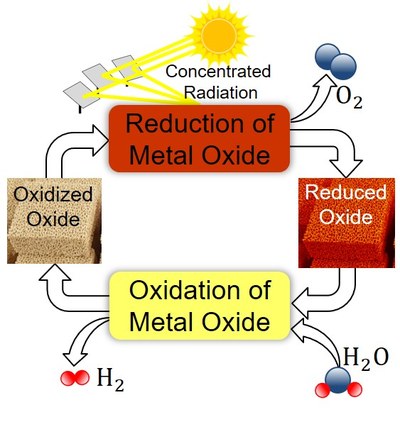SolarFuelNow

Efficient Control of Solar Fuel Production by DNI Nowcasts
Duration: 1.9.2020 - 31.8.2023
In the joint project SolarFuelNow, a model predictive multivariable control (MPC) is being developed for a system of several solar chemical reactors for hydrogen and synthesis gas production. For the project, the DLR Institute for Future Fuels will cooperate with the Institute of Automatic Control of the RWTH Aachen University, with the Stausberg & Vosding GmbH, with the CSP Services GmbH and with the DLR Institute of Solar Research. The MPC is intended to enable a safe and efficient operation of the reactors and will be demonstrated at the Juelich Solar Tower. Fluctuations in solar irradiance will be integrated in the control by a nowcasting system that works with cloud images and which also will be improved in the project.
The project is motivated by the fact that the control of solar chemical reactors is a crucial factor for the efficiency and economic viability of solar chemical processes, but still has not been investigated much so far. Therefore, the development of suitable control methods has the potential to improve many high-temperature solar chemical processes. Within this project, thermochemical redox cycles are examined as an example. However, the developed methods can also be adapted to other solar chemical processes.

In the solar thermochemical redox cycles, first a redox material is being reduced with concentrated solar energy (see the graphic). It is then oxidized by water vapor, carbon dioxide or a mixture of these gases, producing hydrogen, carbon monoxide or synthesis gas respectively. The synthesis gas serves as a base chemical for synthetically produced hydrocarbons, in particular for kerosene and other liquid fuels. The SolarFuelNow project is oriented towards reactors with a monolithic structure of the redox material, as used in the ASTOR_ST project.
New model predictive multivariable control
Chemical processes have special requirements for concentrating solar systems: The power provided by the heliostat field must be controlled according to the desired reaction path; maintaining a constant set point is not sufficient. A large plant will consist of several reactors, each running sub-processes. Falling below the very high target temperatures in the respective reactor chambers can lead to significant efficiency losses due to the nonlinearity of the chemical reactions, thus making the process uneconomical. Therefore, the novel model predictive multivariable control (MPC) is developed, which allows the optimization of the heliostat aim points and of the mass flows of each reactor chamber.
The scheme will take predictions of direct radiation on the heliostat field into account, that are generated by a cloud camera system. This system, developed in the BMWi projects Wobas and Wobas A, will be improved in SolarFuelNow in terms of temporal resolution, accuracy, and uncertainty specification in order to be able to use it for the MPC of solar chemical processes. Finally, the entire system will be tested using a combination of a real reactor chamber and several low-cost reactor mockups in Juelich. In this way the increase in hydrogen production by the incorporation of the MPC and the cloud camera system will be quantified.
The DLR Institute for Future Fuels coordinates the joint project and is responsible for the creation of reactor models and for the implementation of the demonstration experiment. It also supports the partners in the development and implementation of the control concept. The DLR Institute for Solar Research, together with the CSP Services GmbH, is improving the cloud camera system, developing heliostat field models and, together with the RWTH Aachen University and the Stausberg & Vosding GmbH, is implementing the model predictive control in the heliostat field control system at the Juelich Solar Tower.
Project | SolarFuelNow |
|---|---|
Duration | 1.9.2020 - 31.8.2023 |
Project participants | |
Funding | Supported by the Federal Ministry for Economic Affairs and Energy |


